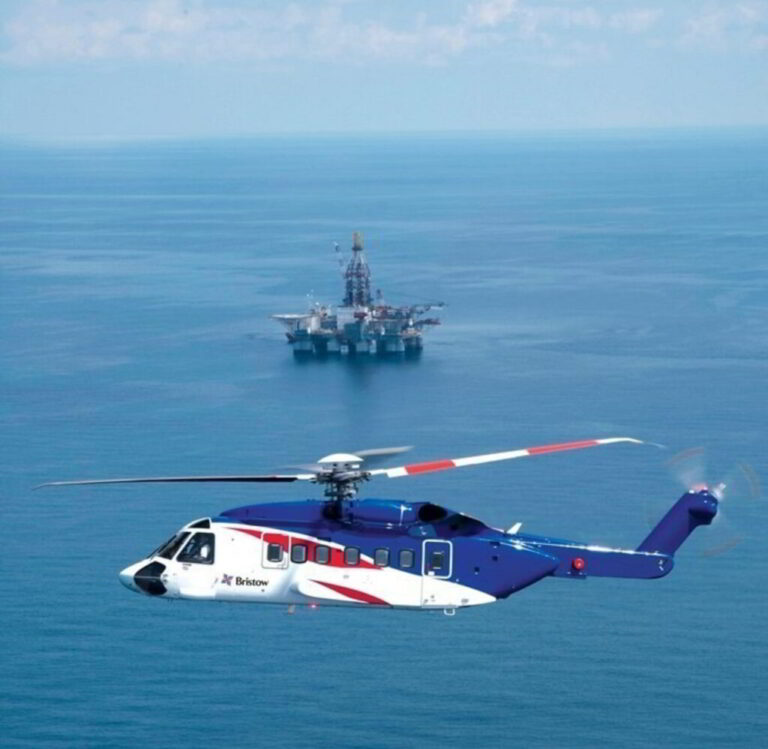Home Fossil Energy Update: Flights cleared for takeoff after suspension due to tragic helicopter crash
Following the tragic helicopter accident, which led to the death of a crew member, major operators on the Norwegian Continental Shelf (NCS) decided to pause all flights to and from offshore installations to glean more insight into the situation and the root cause behind it. All the companies – coordinated through Offshore Norge – have now made up their minds to resume their flights, according to Norway’s state-owned energy giant, Equinor.

One of Bristow Group’s search and rescue (SAR) helicopters was recently involved in an accident during a training assignment approximately 15 nautical miles west of Bergen off the coast of Norway. At the time of the incident, the helicopter, registration LN-OIJ with six crew members on board, was on a training assignment for Equinor and was connected to the SAR service for the Oseberg area in the North Sea.
This tragic event led to the death of one of the crew members, Reidun Hestetun (61), as confirmed by the police on Friday, March 1. Described by her close colleagues as a highly skilled and reliable SAR nurse with high personal integrity, Hestetun, who worked as an HSE coordinator and SAR nurse from 2009 at the Oseberg field center, joined Equinor in 2002. Previously, she worked as a nurse on the Grane and Troll C installations.
Anders Opedal, Equinor’s CEO, underlined: “Our thoughts are first and foremost with the family and friends who have lost their beloved Reidun in this tragic accident. In Equinor, we mourn the loss of a close and dear colleague. We extend our deepest condolences to family and friends during this difficult time.”
As a result of the incident, Equinor and many others decided to halt regular flights on the NCS out of consideration for those affected and to get an overview of the situation. The Norwegian giant explains that the time while flights were grounded was used to take care of relatives, review the situation, and make the necessary clarifications with the authorities and flight safety specialists to ensure that flights could be resumed safely.
Kjetil Hove, Equinor’s Executive Vice President for Exploration & Production Norway, commented: “This serious incident affects us all. Flight safety and the safety of everyone travelling by helicopter is fundamental to our operations. Based on dialogue with the Civil Aviation Authority, there are no indications that helicopter safety on the NCS is reduced.”
Posted: 1 day ago
A decision to resume flights requires coordination between the aviation authorities, helicopter operators, trade unions, and NCS operating companies. In consultation with the Civil Aviation Authority, Equinor has now decided to resume flights with the Sikorsky S-92 helicopters to the installations on the NCS along with all other companies coordinated through Offshore Norge. After the Norwegian Safety Investigation Authority arrived in Bergen on Thursday morning, investigations into the helicopter crash kicked off and are ongoing.
Baste Daltveit, Coordinating Head Safety Delegate for Equinor on the NCS on behalf of unions and the safety delegates, stated: “The unions and safety delegates are satisfied with the information we have received during the process. We thought it was right that flights were paused after the accident. When the authorities and other professional communities say that it is safe to start ordinary transport services, we must have great confidence in them and the decisions that have been made.”
15 new choppers boost Equinor’s helicopter capacity
Meanwhile, Equinor has got a hold of 15 new helicopters for passenger traffic on the Norwegian Continental Shelf through contracts with helicopter manufacturers Bell and Leonardo. Following an extensive process, the Norwegian energy player has qualified new helicopter types for passenger transport on the NCS and will receive ten new Bell 525 helicopters and five AW189 helicopters.
“These helicopter types will supplement the current Sikorsky S-92. All three helicopter models meet stringent safety requirements. By increasing from one to three helicopter models on the NCS we get more flexibility and regularity,” elaborated Hove.
The first two helicopters are slated to be delivered from Leonardo in the first quarter of 2025. The firm will deliver three more helicopters in 2026 while Bell will deliver four. The delivery of the remaining six helicopters from Bell will be completed in line with the agreed production plan for 2027-2030. Equinor claims that the contract negotiations for these helicopters were completed before the accident on February 28.
“All Equinor unions, including the safety delegates, have been thoroughly involved in the process and are positive that the company has taken this initiative. These helicopters have the quality and characteristics that we need offshore,” underlined the unions and safety delegates in a joint statement.
With an extensive flight program, Equinor annually transports 160,000 offshore employees to and from the NCS, which amounts to more than 24,000 flight hours annually. Two helicopter operators, Bristow and CHC, currently have 46 Sikorsky S-92 machines on the NCS, 24 of which are under contract with Equinor.
Ørjan Kvelvane, Equinor’s Senior Vice President for Joint Operations Support, highlighted: “We depend on safe and efficient logistics operations to maintain a high activity level on the NCS well into the future. The new models feature technological improvements in terms of pilot support systems, passenger comfort and noise reduction.”
This comes after Equinor inked a contract with Lufttransport RW in January 2024 to operate two new search and rescue Leonardo AW 139 helicopters for the Troll and Oseberg areas.
>>> Read full article>>>
Copyright for syndicated content belongs to the linked Source : OffshoreEnergy – https://www.offshore-energy.biz/update-flights-cleared-for-takeoff-after-suspension-due-to-tragic-helicopter-crash/